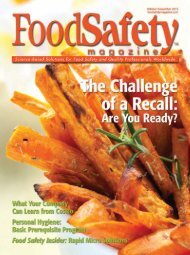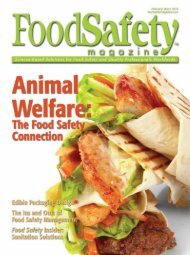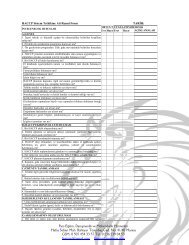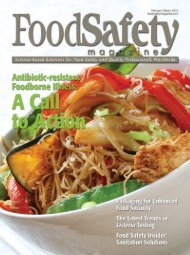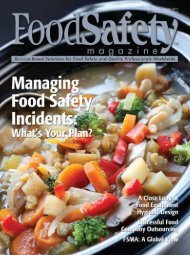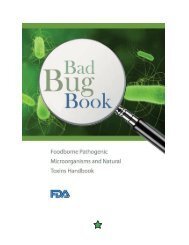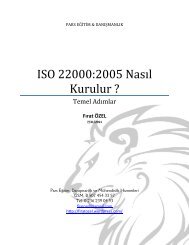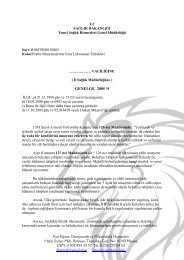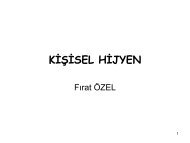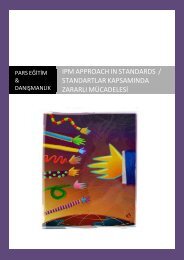Food Safety Magazine - June/July 2013
Food Safety Magazine - June/July 2013
Food Safety Magazine - June/July 2013
You also want an ePaper? Increase the reach of your titles
YUMPU automatically turns print PDFs into web optimized ePapers that Google loves.
PRODUCE<br />
by any producer, buyer or auditor<br />
• A standard that is flexible enough to adapt as science reveals<br />
better practices and limits<br />
A Technical Working Group (TWG) was formed, comprising<br />
over 150 volunteer technical experts in the areas of food<br />
safety and growing and handling practices for a wide variety<br />
of commodities and growing regions. In face-to-face meetings<br />
over 5 months, supported by a variety of grower and buying<br />
organizations that hosted the meetings, the TWG reviewed<br />
13 commonly accepted fresh produce food safety standards,<br />
identified the commonalities and selected the words from<br />
each that best suited a common standard, without sacrificing<br />
any food safety considerations. Recognizing that GAPs audits<br />
can extend from the field through on-farm processes like cooling,<br />
storage and transportation, the TWG split the standard<br />
into two. The results were the Field Operations and Harvesting<br />
Harmonized <strong>Food</strong> <strong>Safety</strong> Standard, applicable to all field<br />
operations and greenhouses, and the Post-harvest Harmonized<br />
<strong>Food</strong> <strong>Safety</strong> Standard, applicable only to those growing operations<br />
that have such facilities on-site.<br />
Once the standards were drafted, teams of auditors and<br />
buyers field-tested them at over a dozen volunteer operations,<br />
many of which had not been involved in drafting the<br />
standards, ranging from large operations to the smallest family<br />
operations, and for commodities as diverse as potatoes, berries,<br />
leafy greens and citrus. These “pilot audits” resulted in<br />
a few changes to the draft standards, but everyone involved<br />
agreed that the Harmonized Standards achieved the parameters<br />
of the Steering Committee and could replace all of the<br />
GAPs food safety audit checklists currently in use.<br />
Where We Are<br />
Operations Committee and Standards Policies. The Steering<br />
Committee recognized that completion of the Harmonized<br />
Standards would not be sufficient. To be sustainable beyond<br />
their initial use, policies and procedures would need to be<br />
established for how the standards would be managed and<br />
maintained. To that end, they commissioned an “Operations<br />
Committee.” Led by Wegmans Vice President of Produce<br />
Dave Corsi, the Operations Committee was charged with recommending<br />
responsibilities for ownership of the standards,<br />
how audit organizations would access and be trained on the<br />
standards, how disputes about the interpretation of the standards<br />
would be managed and how revisions to the standards<br />
would be managed. The Operations Committee completed its<br />
charge in five short meetings, concluding the following: The<br />
Harmonized Standards will continue to be “owned” by the<br />
industry, represented by the TWG, which will remain a volunteer<br />
organization of fresh produce stakeholders. United Fresh<br />
Produce Association, which had coordinated the efforts from<br />
the beginning, will serve as Secretariat for management of the<br />
Harmonized Standards.<br />
Official versions of the Harmonized Standards will continue<br />
to be freely accessible and downloadable from the United<br />
Fresh website. Audit organizations that choose to offer audits<br />
using the Harmonized Standards will sign no-cost licensing<br />
agreements with United Fresh, confirming that 1) they will use<br />
“...the produce industry came together to reduce the audit burden that<br />
it had enabled by accepting and supporting a wide variety of food safety<br />
audit standards...”<br />
the Harmonized Standards verbatim, 2) all auditors performing<br />
audits to the Harmonized Standards will be trained using<br />
official, uniform training materials and 3) any unresolved<br />
disputes between auditors and auditees of how the standards<br />
are to be interpreted will be brought to a “Calibration Committee”<br />
(see below) for resolution.<br />
The Operations Committee agreed with the TWG not to<br />
restrict the audit process used by an audit organization, that<br />
is, how the organization chooses, trains and manages its auditors,<br />
how it performs the audits, how it decides “pass/fail” certification<br />
or scoring of an operation and how it manages corrective<br />
actions and audit reports. While the TWG was successful<br />
in achieving the Harmonized Standards, most agreed that<br />
achieving the same success in harmonizing audit processes was<br />
not possible at this time, and decided to leave judgment on<br />
the “right” audit process to individual audit customers.<br />
Recommendations for changes to the Harmonized Standards<br />
can be submitted by anyone at anytime to United Fresh,<br />
which will coordinate first with the Calibration Committee,<br />
then with the full TWG to determine whether the recommendation<br />
would be best considered through on-site frequently<br />
asked questions, or by formally changing the standards.<br />
The Operations Committee considered whether riders<br />
(those additional items added to audit checklists, usually<br />
unique to and at the request of specific buyers) should be<br />
prohibited when using the Harmonized Standards. After all,<br />
the buyers, growers and auditors had all agreed to what was<br />
required to assess whether an operation had implemented an<br />
effective food safety program; why add more to the checklist<br />
and risk going back to multiple standards? However, the committee<br />
realized that the initiative did not have the authority to<br />
tell buyers what they could and could not require in an audit,<br />
and trying to do so would only serve as a barrier to the use of<br />
the Harmonized Standards. So ultimately riders were permitted,<br />
with the recommendation that anyone requiring a rider<br />
submit it to the TWG for consideration; if the rider is necessary<br />
for food safety, then it should be incorporated into the<br />
Harmonized Standards.<br />
Who Is Accepting Audits to the Harmonized Standards? With<br />
60 F o o d S a f e t y M a g a z i n e



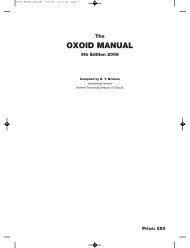
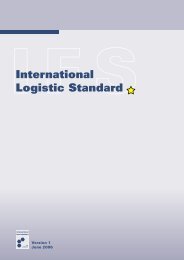
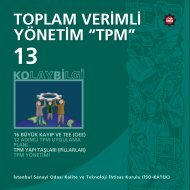
![Otomatik indirilmez ise tıklayınız [Download]](https://img.yumpu.com/44170525/1/190x190/otomatik-indirilmez-ise-taklayanaz-download.jpg?quality=85)
